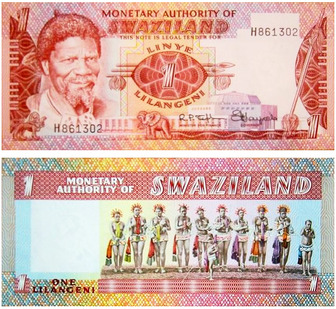The currency name of SWAZILAND is the Lilangeni

Today Swaziland is inhabited mostly by the Swazi‚'s a group of people who migrated from the Bantu tribes central Africa in the fifteenth and sixteenth century. Their main language is siSwati but English is spoken as a second language. The Swazi culture has been passed down from generation to generation through stories and word of mouth and many of the same traditions continue today. Their main festival called Incwala and meaning Festival of the First Fruits is a ceremony that is supposed to give strength to the King and nation. Since Swaziland is a monarchy, the king absolutely and completely rules. Their second most popular ceremony is called Umhlanga or Reed Dance is where the maidens or girls of marriage age gather reeds and present them to the queen. The country gained its independence in 1968.
Economically Swaziland with its population of 1,137,000 has not kept up with its neighboring countries because of droughts and an Aids epidemic. Twenty six percent of its population is infected. Life expectancy is only 45 years. Most inhabitants make the US equivalent of $1.25 per day with farming and coal mining being its main industries. Agricultural products include sugar cane, cotton and tobacco. Another product is soft drink concentrations.
Lilangeni (E1) is the basic unit of money in Swaziland. It equals one hundred cents. The lilangeni was introduced in 1974 and it is equivalent to the South African rand. There are several denomination of money issued as notes including E200-green, E100-brown, E50-orange, E20-maroom, and E10-blue. There are also gold coins and silver coins. The Swaziland economy is dependent on the South African economy because that is the country where it receives 90' of its imports and sends 70' of its exports. For this reason, it is common to see the South African currency, the rand, there. It also trades with the United States and the European Union. Tourists who visit the country each year should understand that the lilangeni is used only in Swaziland and they should have it converted back to their home currency before leaving Swaziland.
